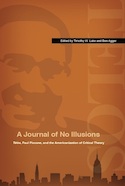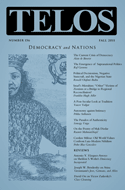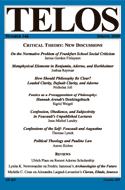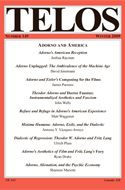By Telos Press · Wednesday, September 28, 2011 For all fans of Telos in the New York City area, we will be holding a book launch for A Journal of No Illusions: Telos, Paul Piccone, and the Americanization of Critical Theory, edited by Timothy Luke and Ben Agger, on Tuesday, October 4, from 7pm to 9pm, at St. Mark’s Bookshop, 31 Third Avenue, New York, NY.
 In 1968, when Paul Piccone started a journal called Telos, no one could have reasonably expected for it to become an intellectual institution. Originally conceived as the self-consciousness of the American New Left, the journal soon ranged more widely as its authors introduced European social theory and philosophy to a largely American audience unaware of these traditions. Piccone forged a “journal of no illusions” that was iconoclastic, skeptical, and yet motivated by the hope that critique and engagement could become constitutive principles for politics and everyday practices. In this book, an array of authors, many of whom participated in the development of Telos, examine the ongoing legacy of the journal, and address the ways in which Telos formed a generation of young intellectuals, who asked for a “critical theory” to understand both the impasses and possibilities for a progressive politics. In 1968, when Paul Piccone started a journal called Telos, no one could have reasonably expected for it to become an intellectual institution. Originally conceived as the self-consciousness of the American New Left, the journal soon ranged more widely as its authors introduced European social theory and philosophy to a largely American audience unaware of these traditions. Piccone forged a “journal of no illusions” that was iconoclastic, skeptical, and yet motivated by the hope that critique and engagement could become constitutive principles for politics and everyday practices. In this book, an array of authors, many of whom participated in the development of Telos, examine the ongoing legacy of the journal, and address the ways in which Telos formed a generation of young intellectuals, who asked for a “critical theory” to understand both the impasses and possibilities for a progressive politics.
Continue reading →
By Russell A. Berman · Monday, September 19, 2011 Telos 156 (Fall 2011) is now available for purchase here.
 Will Europe be able to master its debt crisis and prevent the spread of economic instability throughout the eurozone? Will the political leadership in the United States be able to manage the challenge of the debt limit and, more broadly, the ongoing problems with the federal budget? As this issue of Telos goes to press, each of these dramas is still playing out, and the conclusion to neither is predictable. Will the euro crumble, will Washington grind to a halt? Probably not. Yet if Europe’s contagion is ultimately contained, and if the United States dodges the bullet and avoids default, it will only have been in the nick of time. Perhaps some tired observers will heave a sigh of relief and reassure themselves that the system has worked. Of course, escaping catastrophe is better than the alternative, and no one should be wishing for the worst. But this is not a matter of wishful thinking at all. Magic will not save us. On the contrary, this is about contemporary politics and the apparent inability of existing political institutions to address vital matters in an effective manner. Will Europe be able to master its debt crisis and prevent the spread of economic instability throughout the eurozone? Will the political leadership in the United States be able to manage the challenge of the debt limit and, more broadly, the ongoing problems with the federal budget? As this issue of Telos goes to press, each of these dramas is still playing out, and the conclusion to neither is predictable. Will the euro crumble, will Washington grind to a halt? Probably not. Yet if Europe’s contagion is ultimately contained, and if the United States dodges the bullet and avoids default, it will only have been in the nick of time. Perhaps some tired observers will heave a sigh of relief and reassure themselves that the system has worked. Of course, escaping catastrophe is better than the alternative, and no one should be wishing for the worst. But this is not a matter of wishful thinking at all. Magic will not save us. On the contrary, this is about contemporary politics and the apparent inability of existing political institutions to address vital matters in an effective manner.
Continue reading →
By Timothy Stacey · Sunday, August 14, 2011 The past few days have seen the worst unrest in the UK since the 2001 Bradford Race Riots. Residents have watched from the questionable safety of their homes as mobs of men, women, boys, and girls attack and set light to shops, cars, and buses. Sometimes bystanders and journalists have been attacked too. Many have been shocked by the tendency of some to smash rather than steal expensive goods. The following is a dispassionate look at the facts and possible causes, followed by a controversially hopeful look into what the riots, and the reactions to them, might mean for the future of community in Britain.
Continue reading →
By Charles Kollmer · Monday, August 8, 2011 As an occasional feature on TELOSscope, we highlight a past Telos article whose critical insights continue to illuminate our thinking and challenge our assumptions. Today, Charles Kollmer looks at Nicholas Joll’s “How Should Philosophy Be Clear? Loaded Clarity, Default Clarity, and Adorno,” from Telos 146 (Spring 2009).
 In an apropos piece of metaphilosophy entitled “How Should Philosophy Be Clear?” Nicholas Joll offers several insights on the concept of clarity in relation to philosophical texts. On initial inspection, Joll’s style seems to reveal a bias towards the Analytical tradition in philosophy: his argumentation is clearly organized, rigorous, and formulated in logical propositions. Yet his work also attains the savvy and self-awareness that renders metaphilosophy convincing, as demonstrated in his first proposition, which states that any notion of clarity will be partisan with regards to the Analytical-Continental divide. In spite of this partisanship, Joll champions a concept of “default clarity” and demonstrates its aptitude for judiciously evaluating argumentation. He shrewdly refuses to overdetermine the prescriptive force of default clarity. Far from an immutable law, default clarity offers broad guidelines with the caveat that “the justificatory burden lies with those who would eschew such clarity.” In an apropos piece of metaphilosophy entitled “How Should Philosophy Be Clear?” Nicholas Joll offers several insights on the concept of clarity in relation to philosophical texts. On initial inspection, Joll’s style seems to reveal a bias towards the Analytical tradition in philosophy: his argumentation is clearly organized, rigorous, and formulated in logical propositions. Yet his work also attains the savvy and self-awareness that renders metaphilosophy convincing, as demonstrated in his first proposition, which states that any notion of clarity will be partisan with regards to the Analytical-Continental divide. In spite of this partisanship, Joll champions a concept of “default clarity” and demonstrates its aptitude for judiciously evaluating argumentation. He shrewdly refuses to overdetermine the prescriptive force of default clarity. Far from an immutable law, default clarity offers broad guidelines with the caveat that “the justificatory burden lies with those who would eschew such clarity.”
Continue reading →
By Charles Kollmer · Tuesday, August 2, 2011 As an occasional feature on TELOSscope, we highlight a past Telos article whose critical insights continue to illuminate our thinking and challenge our assumptions. Today, Charles Kollmer looks at David Jenemann’s “Adorno Unplugged: The Ambivalence of the Machine Age,” from Telos 149 (Winter 2009).
 The work of Theodor W. Adorno is replete with paradox, and the abundant and irresolvable tensions in his writings reflect the disheartening milieu in which he wrote. Based on a cursory reading of “The Culture Industry: Enlightenment as Mass Deception,” from Adorno and Horkheimer’s Dialectic of Enlightenment, we might be left with the impression that Adorno wielded this rhetorical weapon in a uniform manner, indicating the ways in which the modern fruits of Enlightenment contradict the original ethos of Enlightenment thought. Indeed, these are difficult charges to refute, as modernity’s myriad episodes of mass violence render notions of teleological “progress” rather untenable. Poststructuralist thought exhibits a reverence for this innovation in thinking. According to Antoni Negri, “Adorno’s model of cultural criticism genuinely uncovered the ontology of the new world” (cited in Jenemann). Yet these same tracts always contain caveats, noting that, despite the paradox and contradiction inherent in modern infrastructure and society, modernity presents us with multitudinous opportunities for radically disrupting the stasis of the status quo. This is the “situation of those who are living through the passage from modernity to postmodernity,” writes Negri. Such caveats imply that Adorno’s critical theory fails to recognize these possibilities for change, at worst typecasting him as a grumpy Luddite. The work of Theodor W. Adorno is replete with paradox, and the abundant and irresolvable tensions in his writings reflect the disheartening milieu in which he wrote. Based on a cursory reading of “The Culture Industry: Enlightenment as Mass Deception,” from Adorno and Horkheimer’s Dialectic of Enlightenment, we might be left with the impression that Adorno wielded this rhetorical weapon in a uniform manner, indicating the ways in which the modern fruits of Enlightenment contradict the original ethos of Enlightenment thought. Indeed, these are difficult charges to refute, as modernity’s myriad episodes of mass violence render notions of teleological “progress” rather untenable. Poststructuralist thought exhibits a reverence for this innovation in thinking. According to Antoni Negri, “Adorno’s model of cultural criticism genuinely uncovered the ontology of the new world” (cited in Jenemann). Yet these same tracts always contain caveats, noting that, despite the paradox and contradiction inherent in modern infrastructure and society, modernity presents us with multitudinous opportunities for radically disrupting the stasis of the status quo. This is the “situation of those who are living through the passage from modernity to postmodernity,” writes Negri. Such caveats imply that Adorno’s critical theory fails to recognize these possibilities for change, at worst typecasting him as a grumpy Luddite.
Continue reading →
By Laura Groenendaal · Wednesday, July 27, 2011 As an occasional feature on TELOSscope, we highlight a past Telos article whose critical insights continue to illuminate our thinking and challenge our assumptions. Today, Laura Groenendaal looks at Hans Ulrich Gumbrecht’s “From Oedipal Hermeneutics to a Philosophy of Presence,” from Telos 138 (Spring 2007).
In his article “From Oedipal Hermeneutics to a Philosophy of Presence,” Hans Ulrich Gumbrecht responds to a colloquium’s debate on whether “academic heresy” can produce “revolutions within the humanities” by rejecting its language:
I see the humanities as a cluster of disciplines that continuously shifts and, by shifting, transforms itself—mostly (but not always) without any programmatic direction, and sometimes stirring up sudden splashes, waves, and even tsunamis in the formless ocean of the public sphere. If anything, such splashes, waves, and tsunamis follow (and here I am producing my own metaphorical contradiction) an emotional “logic” of family romances and oedipal revolts, rather than the institutional logic of heresies and revolutions.
Continue reading →
|
|
 In 1968, when Paul Piccone started a journal called Telos, no one could have reasonably expected for it to become an intellectual institution. Originally conceived as the self-consciousness of the American New Left, the journal soon ranged more widely as its authors introduced European social theory and philosophy to a largely American audience unaware of these traditions. Piccone forged a “journal of no illusions” that was iconoclastic, skeptical, and yet motivated by the hope that critique and engagement could become constitutive principles for politics and everyday practices. In this book, an array of authors, many of whom participated in the development of Telos, examine the ongoing legacy of the journal, and address the ways in which Telos formed a generation of young intellectuals, who asked for a “critical theory” to understand both the impasses and possibilities for a progressive politics.
In 1968, when Paul Piccone started a journal called Telos, no one could have reasonably expected for it to become an intellectual institution. Originally conceived as the self-consciousness of the American New Left, the journal soon ranged more widely as its authors introduced European social theory and philosophy to a largely American audience unaware of these traditions. Piccone forged a “journal of no illusions” that was iconoclastic, skeptical, and yet motivated by the hope that critique and engagement could become constitutive principles for politics and everyday practices. In this book, an array of authors, many of whom participated in the development of Telos, examine the ongoing legacy of the journal, and address the ways in which Telos formed a generation of young intellectuals, who asked for a “critical theory” to understand both the impasses and possibilities for a progressive politics.  Will Europe be able to master its debt crisis and prevent the spread of economic instability throughout the eurozone? Will the political leadership in the United States be able to manage the challenge of the debt limit and, more broadly, the ongoing problems with the federal budget? As this issue of Telos goes to press, each of these dramas is still playing out, and the conclusion to neither is predictable. Will the euro crumble, will Washington grind to a halt? Probably not. Yet if Europe’s contagion is ultimately contained, and if the United States dodges the bullet and avoids default, it will only have been in the nick of time. Perhaps some tired observers will heave a sigh of relief and reassure themselves that the system has worked. Of course, escaping catastrophe is better than the alternative, and no one should be wishing for the worst. But this is not a matter of wishful thinking at all. Magic will not save us. On the contrary, this is about contemporary politics and the apparent inability of existing political institutions to address vital matters in an effective manner.
Will Europe be able to master its debt crisis and prevent the spread of economic instability throughout the eurozone? Will the political leadership in the United States be able to manage the challenge of the debt limit and, more broadly, the ongoing problems with the federal budget? As this issue of Telos goes to press, each of these dramas is still playing out, and the conclusion to neither is predictable. Will the euro crumble, will Washington grind to a halt? Probably not. Yet if Europe’s contagion is ultimately contained, and if the United States dodges the bullet and avoids default, it will only have been in the nick of time. Perhaps some tired observers will heave a sigh of relief and reassure themselves that the system has worked. Of course, escaping catastrophe is better than the alternative, and no one should be wishing for the worst. But this is not a matter of wishful thinking at all. Magic will not save us. On the contrary, this is about contemporary politics and the apparent inability of existing political institutions to address vital matters in an effective manner.  In an apropos piece of metaphilosophy entitled “How Should Philosophy Be Clear?” Nicholas Joll offers several insights on the concept of clarity in relation to philosophical texts. On initial inspection, Joll’s style seems to reveal a bias towards the Analytical tradition in philosophy: his argumentation is clearly organized, rigorous, and formulated in logical propositions. Yet his work also attains the savvy and self-awareness that renders metaphilosophy convincing, as demonstrated in his first proposition, which states that any notion of clarity will be partisan with regards to the Analytical-Continental divide. In spite of this partisanship, Joll champions a concept of “default clarity” and demonstrates its aptitude for judiciously evaluating argumentation. He shrewdly refuses to overdetermine the prescriptive force of default clarity. Far from an immutable law, default clarity offers broad guidelines with the caveat that “the justificatory burden lies with those who would eschew such clarity.”
In an apropos piece of metaphilosophy entitled “How Should Philosophy Be Clear?” Nicholas Joll offers several insights on the concept of clarity in relation to philosophical texts. On initial inspection, Joll’s style seems to reveal a bias towards the Analytical tradition in philosophy: his argumentation is clearly organized, rigorous, and formulated in logical propositions. Yet his work also attains the savvy and self-awareness that renders metaphilosophy convincing, as demonstrated in his first proposition, which states that any notion of clarity will be partisan with regards to the Analytical-Continental divide. In spite of this partisanship, Joll champions a concept of “default clarity” and demonstrates its aptitude for judiciously evaluating argumentation. He shrewdly refuses to overdetermine the prescriptive force of default clarity. Far from an immutable law, default clarity offers broad guidelines with the caveat that “the justificatory burden lies with those who would eschew such clarity.”  The work of Theodor W. Adorno is replete with paradox, and the abundant and irresolvable tensions in his writings reflect the disheartening milieu in which he wrote. Based on a cursory reading of “The Culture Industry: Enlightenment as Mass Deception,” from Adorno and Horkheimer’s Dialectic of Enlightenment, we might be left with the impression that Adorno wielded this rhetorical weapon in a uniform manner, indicating the ways in which the modern fruits of Enlightenment contradict the original ethos of Enlightenment thought. Indeed, these are difficult charges to refute, as modernity’s myriad episodes of mass violence render notions of teleological “progress” rather untenable. Poststructuralist thought exhibits a reverence for this innovation in thinking. According to Antoni Negri, “Adorno’s model of cultural criticism genuinely uncovered the ontology of the new world” (cited in Jenemann). Yet these same tracts always contain caveats, noting that, despite the paradox and contradiction inherent in modern infrastructure and society, modernity presents us with multitudinous opportunities for radically disrupting the stasis of the status quo. This is the “situation of those who are living through the passage from modernity to postmodernity,” writes Negri. Such caveats imply that Adorno’s critical theory fails to recognize these possibilities for change, at worst typecasting him as a grumpy Luddite.
The work of Theodor W. Adorno is replete with paradox, and the abundant and irresolvable tensions in his writings reflect the disheartening milieu in which he wrote. Based on a cursory reading of “The Culture Industry: Enlightenment as Mass Deception,” from Adorno and Horkheimer’s Dialectic of Enlightenment, we might be left with the impression that Adorno wielded this rhetorical weapon in a uniform manner, indicating the ways in which the modern fruits of Enlightenment contradict the original ethos of Enlightenment thought. Indeed, these are difficult charges to refute, as modernity’s myriad episodes of mass violence render notions of teleological “progress” rather untenable. Poststructuralist thought exhibits a reverence for this innovation in thinking. According to Antoni Negri, “Adorno’s model of cultural criticism genuinely uncovered the ontology of the new world” (cited in Jenemann). Yet these same tracts always contain caveats, noting that, despite the paradox and contradiction inherent in modern infrastructure and society, modernity presents us with multitudinous opportunities for radically disrupting the stasis of the status quo. This is the “situation of those who are living through the passage from modernity to postmodernity,” writes Negri. Such caveats imply that Adorno’s critical theory fails to recognize these possibilities for change, at worst typecasting him as a grumpy Luddite. 

